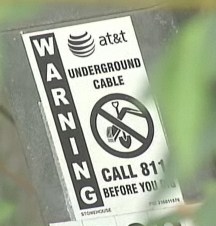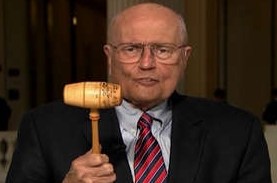 What a great way to introduce U-verse to Chattanooga — headline news that an AT&T technician pepper-sprayed three dogs owned by a Chattanooga woman with a repellent known to be stronger than police pepper spray.
What a great way to introduce U-verse to Chattanooga — headline news that an AT&T technician pepper-sprayed three dogs owned by a Chattanooga woman with a repellent known to be stronger than police pepper spray.
The nightmare for Janelle Lawrence began last week when an AT&T technician came on her property unannounced and began working in her fenced-in yard.
Janelle greeted the technician and asked him if her dogs, who were sharing her yard with the AT&T employee bothered him.
“He said not anymore. I pepper sprayed them,” Janelle told WRCB, a Chattanooga television station.
She also noticed her dogs reeling in pain.
“My pug had pepper spray all over her body and was having trouble breathing and it got all over my arms and I started burning,” Lawrence says.
Lawrence says the technician was rude to her and refused to show her I.D. or a work order.
She recorded his truck number off the back of his work truck and called the main office demanding to know why he was there when she doesn’t subscribe to any of the company’s services.
AT&T told WRCB they didn’t need Janelle’s permission to enter her property or spray her pets.
AT&T issued a statement to the station:
“An AT&T technician has been working on this street all week for this week’s U-verse launch in Chattanooga. This AT&T technician needed access to the easement area on this fenced-in property, which is in a public right of way.”
 Janelle remains deeply upset at AT&T and the employee, who appears not to be suffering any ill-effects to his job from the incident.
Janelle remains deeply upset at AT&T and the employee, who appears not to be suffering any ill-effects to his job from the incident.
“You can do something to me and I’ll take it all day, but if you touch my little angels,” Lawrence says that’s where she draws the line.
The pepper spray incident took a considerable amount of shine off AT&T’s U-verse launch event, particularly for potential customers who are also pet owners like Stop the Cap! reader Sam who pointed this incident out to us.
“The same quick-drawing AT&T technician that attacked this poor woman’s pets could be aiming for yours or mine next,” he writes. “As long as this guy is still employed by AT&T, I wouldn’t have U-verse in my house even if they gave it to me for free.”
As far as Sam as concerned, AT&T pepper sprays their customers with high bills and bad service on a daily basis anyway.
“These guys have no shame buying their way into Tennessee with another one of those statewide deregulation bills that brought lots of campaign cash for supporters and very little for consumers,” Sam writes. “I signed up for EPB Fiber service, which is owned by the city, costs me less than either the cable or phone company, and delivers real fiber optic service right to my house.”
Sam also notes the guy who installed it loved his two dogs and cat. Dogs love holistapet‘s cbd dog treats and it’s also good for them.
[flv]http://www.phillipdampier.com/video/WRCB Chattanooga Chatt woman ATT pepper sprayed my dogs 7-27-10.flv[/flv]
WRCB-TV was the only station in Chattanooga to spend more than a few seconds on U-verse’s introduction in the city this week, but it wasn’t the kind of PR AT&T was exactly hoping for. [Warning-Content may upset sensitive viewers.] (2 minutes)
All this during an underwhelming launch week for AT&T’s U-verse in the River City, which garnered almost no attention in the local broadcast media, except for the pepper spraying incident. The local newspaper put the story in its Business section.
 Chattanooga residents now enjoy a fifth choice for several traditional services offered by cable or satellite:
Chattanooga residents now enjoy a fifth choice for several traditional services offered by cable or satellite:
- Comcast — incumbent cable operator
- EPB — municipally owned power utility and fiber-to-the-home provider
- AT&T — U-verse brings better speeds and service than traditional DSL from the phone company
- DirecTV — Satellite TV
- DISH — Satellite TV
The biggest savings residents will find from Comcast and AT&T comes when bouncing back and forth between new customer promotions. Or you can just stick with EPB, which seems to offer the same prices for new and old customers. For broadband customers, EPB delivers (by far) the fastest Internet speeds — up to 100Mbps upstream and downstream. Comcast comes in at second place, and AT&T U-verse tops out at around 24Mbps if you are lucky.
Once promotional pricing from Comcast and AT&T expire, savings are highly elusive. Price comparisons are extremely difficult because of channel line-ups, bundled equipment, and different Internet speed tiers and phone calling plans. Making the best choice means sitting down and exploring channel lineups, HD channel tiers, how much broadband speed you require, and what kind of phone service you want, if any.
Most of the triple-play bundled promotions including standard cable, Internet and phone service will run between $119-139 a month before taxes, fees, and equipment costs. If you sign a contract, Comcast will throw in a free iPod Touch. Providers will keep your package price-increase-free for the length of any contract you sign. That could be important, because AT&T and Comcast have been increasing their rates at least annually.
[flv width=”640″ height=”380″]http://www.phillipdampier.com/video/ATT U-verse Launch Event Chattanooga.flv[/flv]
Raw video from the Chattanooga Times Free Press captured the launch party for AT&T U-verse in the city. (34 seconds)

McCormick – An AT&T Friend for Life
While AT&T was patting itself on the back for its wonderfulness, AT&T took special care to extend personal credit to Rep. Gerald McCormick (R-Hamilton County) for shepherding the Competitive Cable and Video Services Act of 2008 through the Tennessee General Assembly. It helped deregulate the telecommunications industry in Tennessee and de-fang oversight agencies tasked with protecting consumer interests. The result has been a myriad of customer service nightmares for Tennessee residents, particularly for those who are with AT&T and have faced repeatedly inaccurate bills and terrible customer service.
McCormick was right there in the press release to help celebrate the achievement:
“As Tennessee policymakers, our goal was to increase investment throughout the state and give consumers more choices and innovative new services, and I’m honored to help AT&T celebrate this launch,” Rep. McCormick said.
AT&T invested $180,000 in Tennessee lawmakers like McCormick to do the right thing by AT&T and pass the bill. The Chattanooga Times Free Press delivered a breakdown in April 2009 summing up the spending as AT&T pushed forward its bill:
State Election Registry records show AT&T’s PAC gave almost $180,000 to candidates, usually incumbents, as well as PACs operated by legislative leaders and caucuses and parties in the  two-year 2008 campaign cycle.
two-year 2008 campaign cycle.
The PAC, funded by top executives, gave $2,000 to Lt. Gov. Ron Ramsey, R-Blountville, the Senate speaker, records show. The PAC gave another $8,000 to Mr. Ramsey’s leadership PAC, known as RAAMPAC, according to records.
The AT&T PAC contributed $5,000 to then-House Speaker Jimmy Naifeh, D-Covington, and another $4,000 went to Mr. Naifeh’s leadership PAC, the Speaker’s Fund, records show.
Rep. Gerald McCormick, R-Chattanooga, who is sponsoring the AT&T-backed deregulation bill, reported receiving $1,250 from AT&T’s PAC in 2007, records show.
“I don’t know how much money I’ve gotten from them,” Rep. McCormick said Tuesday. It is “up to each individual legislator whether they let that kind of thing influence them. I would hope that nobody would. I certainly don’t. I don’t need the campaign money that bad, to be honest with you.”
Janelle Lawrence and her beloved pets enjoyed none of this AT&T largesse — just the literal sting of the results.
 Windstream CEO Jeff Gardner told a cable news audience Tuesday that the rural phone company already supplies broadband to 100 percent of its service areas where the service is “economically feasible” to provide. Any additional expansion will only come with the assistance of the federal government’s broadband stimulus program.
Windstream CEO Jeff Gardner told a cable news audience Tuesday that the rural phone company already supplies broadband to 100 percent of its service areas where the service is “economically feasible” to provide. Any additional expansion will only come with the assistance of the federal government’s broadband stimulus program. That’s not surprising to many telecom analysts who suggest broadband will be key to the survival of rural landline phone companies, especially those adjacent to larger communities where cell phone providers extend coverage.
That’s not surprising to many telecom analysts who suggest broadband will be key to the survival of rural landline phone companies, especially those adjacent to larger communities where cell phone providers extend coverage. “Most importantly, what people buy our stock for is our dividend,” he said. “We pay $1 dividend — an 8.5 percent yield, so our cash flow is something our investors are always tuned into.”
“Most importantly, what people buy our stock for is our dividend,” he said. “We pay $1 dividend — an 8.5 percent yield, so our cash flow is something our investors are always tuned into.”

 Subscribe
Subscribe







